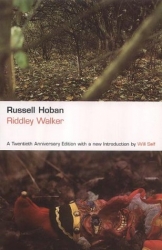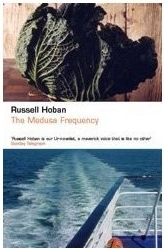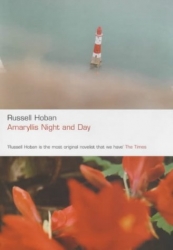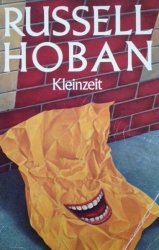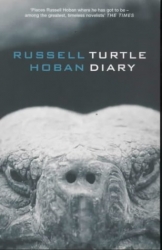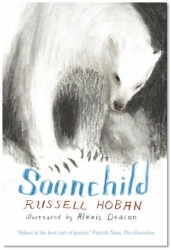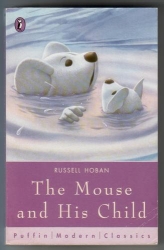Getting into Russell Hoban
Have you maybe heard of Russell Hoban or one of his books, or perhaps stumbled across this site, and wondered "Where do I start..?" Here are some suggested introductions...
I'm interested in: The best known - A short read - An oddball romance - A comic fantasy - The most accessible - The most recent - The children's classic
The Most Celebrated: Riddley Walker
Russell Hoban's 1980 classic divides new readers. As his most well-known novel it's often the one people discover first, but as it's written in an invented corrupted future English and tells a very dark tale, some find it not unreasonably difficult to get into. Others however find the language sweeps them on into an incredible story. In style, the book is like nothing else Hoban ever wrote, so it's far from typical, even though many of its themes are echoed across his work. The brilliant Riddley Walker Annotations website can help a lot with understanding the book, but if you don't find it's for you then there are plenty of other titles you might enjoy.
Sample quotation:
Its some kynd of thing it aint us but yet its in us. Its looking out thru our eye hoals. May be you dont take no noatis of it only some times. Say you get woak up suddn in the middl of the nite. 1 minim youre a sleap and the nex youre on your feet with a spear in your han. Wel it wernt you put that spear in your han it wer that other thing whats looking out thru your eye hoals. It aint you nor it dont even know your name. Its in us lorn and loan and sheltering how it can.
Read more about Riddley Walker
The Short Read: The Medusa Frequency
Hoban's shortest novel, at 144 pages it is also arguably his most lyrical. Some readers consider it Russell Hoban's second masterpiece after Riddley Walker, and it's certainly quintessential Hoban, containing all of his major themes including relationships, London, technology, creativity, language and mythology. The story is narrated by unsuccessful novelist and comic-book writer Herman Orff, who undergoes some experimental neuro-therapy and finds himself hallucinating the dismembered head of Orpheus, which tells him its story, from inventing the lyre and "moving rocks" with his singing, to meeting and then losing Eurydice. Orpheus's story is counterpointed by that of Orff's as he pines for a lost lover and struggles with his own creativity.
Sample quotation:
Alone and blind and endlessly voyaging I think constantly of fidelity. Fidelity is a matter of perception; nobody is unfaithful to the sea or to mountains or to death: once recognised they fill the heart. In love or terror or in loathing one responds to them with the true self; fidelity is not an act of the will: the soul is compelled by recognitions. Anyone who loves, anyone who perceives the other person fully can only be faithful, can never be unfaithful to the sea and the mountains and the death in that person, so pitiful and heroic is it to be a human being.
NB: For an even shorter read and an introduction to Hoban's style and themes, try Message in a (Klein) Bottle, a posthumously-published short story.
Read more about The Medusa Frequency
Read more about Message in a (Klein) Bottle
The Oddball Romance: Amaryllis Night and Day
A delightful and relatively light novel from 2003, in which art teacher Peter Diggs meets the beautiful Amaryllis Potts first in a series of concretely-realised dreams, and then in real life. Contains many of Hoban's favourite themes (relationships, London, the perception of "reality") and motifs (Klein bottles, science and technology, films, museums, music, yellow paper...)
Sample quotation:
She was gone; I was left behind in the present moment, which not a simple finite thing measured by the clock; it’s a palimpsest of all the present moments before it, their images, music, words and whispers rising up through the layered years from the oldest present moment to the newest; and in those moments live, remembered or forgotten, sleeps and wakings and dreams.
Read more about Amaryllis Night and Day
The Original Comedy: Kleinzeit
One of Hoban's own favourites, he has said that "most of me is in Kleinzeit" and "it's where I first found my voice". A brilliantly imaginative comic fantasy, it follows the eponymous modern hero as he is sacked from his job, is admitted to hospital and falls in love with the beautiful ward sister all in the space of a couple of days (and the first few pages). As if that weren't enough, Kleinzeit finds everything speaks to him, from his bathroom mirror to Hospital, Underground, Winter, God and Death - each with their own voices, personalities and jokes.
Sample quotation:
I exist, said the mirror.
What about me? said Kleinzeit.
Not my problem, said the mirror.
The Most Accessible: Turtle Diary
Hoban's third novel, published in 1975, is arguably his most naturalistic. Two lonely Londoners, a bookshop assistant and a children's writer, meet and bond over sea turtles at the zoo, and form a plan to release them back into the ocean. The main characters take it in turns to narrate each chapter in the first person, forming a quietly intense internal monologue as they work to simultaneously free themselves from their respective situations. In 2013 Barnes & Noble brought this book back into print in the US with the first new edition there for many years, while in February 2015 actress Julianne Moore turned up to an interview holding a copy, which caused a minor social media sensation.
Sample quotation:
After all, when you come right down to it, how many people speak the same language even when they speak the same language?
Soonchild was one of the last books Russell Hoban wrote and the last full-length novel to be published, posthumously, in 2012. Aimed at young adults, it nonetheless speaks to older readers, and is perhaps the perfect combination of grown-up complexity with childlike magic and wonder. Sixteen-Face John, a discombobulated shaman given to jogging pants and Coca-Cola, lives in the freezing "North", which could be literal, metaphorical or both. His wife is expecting a daughter, which they plan to name Soonchild, but a crisis arises as the baby can't hear the "World Songs", which all children need to hear before they are born. John embarks on a fantastic quest to find the World Songs and bring them home to Soonchild. Hoban's poetic style and limitless imagination are perfectly matched and amplified by Alexis Deacon's stunning illustrations.
Sample quotation:
the living are the link between the dead and the unborn and the dead have to work all the time to pass along to the unborn all the things they're going to need […] maybe you think you're doing it all by yourself but it's the dead working in you. They simply have no rest, the dead. Life is hard and death is hard, nothing is easy.
The Children's Classic: The Mouse and His Child
Hoban regarded The Mouse and His Child as his first novel, even though it was aimed at a younger audience. The story of two conjoined clockwork mice, a father and son, and their quest to become "self-winding", it begins in a toy shop, with the mouse child pining for the other toys to become his family. The pair are bought and after several years of only being brought out at Christmas, the unhappy mouse child manages to get them thrown into the rubbish. Outside, a passing tramp finds them and sets them on their way with the command, "Be tramps." This begins an amazing adventure where the father and son meet many characters, including Manny Rat, a sleazy, tyrannical crook who uses wind-up toys for slave labour, a snake-oil-peddling, fortune-telling frog and a travelling theatre company run by some crows called The Caws of Art. Rightly considered a children's classic, it bridges the gap between Russell Hoban's early books for young children and his adult novels, and is just as enjoyable for adults and children alike.
Sample quotation:
"I'm not wound anymore," he said.
"Well," said Frog, "I don't suppose anyone ever is completely self-winding. That's what friends are for."

